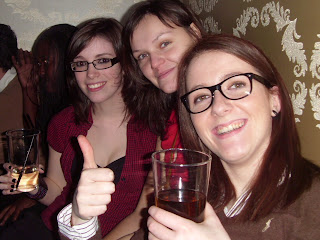Personal and Cultural Development
It became obvious this week that we only begin to understand what our own culture is when we experience others. It is something we take for granted. But, as more and more people have asked me about my own country, I have found myself understanding and appreciating what we have in Northern Ireland. Living with Anaïs and Jitka has also made me realise my personal traits that reflect the culture of my country, but this becomes confusing (yet entertaining!) at times when they think I’m Irish but my habits reflect the ‘English’. They refer to me as English rather than British but for convenience I introduce myself as Irish! Jitka believes I can’t be Irish because I don’t like whiskey! Of course, I’m neither British nor Irish, I’m Northern Irish! :)
To continue the love for winter, I went ice skating this week (outdoors, of course!). I’m not much of a skater so I wasn’t expecting much from this experience. However, being here in Finland has given me a new lease of life that forces me (sometimes against my better reasoning) to participate in and experience new things. Such an opportunity arose at the ice skating event to play ice hockey, something I chose to embrace! Some of my friends found this particularly funny because they held the stereotype of hockey players as ‘big and mean and toothless’, so to see me play was quite a surprise! Personally, I loved it! Although, I would really need to improve upon my skating before I try ice hockey again. Still, at least I tried.
The most significant area of development this week though has been learning the Finnish language. I'm finding the class more and more enjoyable every week (yet still challenging!), and love the fact that I am learning with different people than those that are in most of the rest of my classes. I’m beginning to see the logic behind the language (there is always logic behind what the Finns do), and progress in class activities. I’m happy now that when I go to the next Finnish school I can introduce myself in their language, so the children will be able to understand what I’m saying. All I hope for after that is to communicate with bus drivers (to make it to the schools) and pass the course!
minä puhun englantia ja suomi
(I speak English and Finnish)
Professional Development
Week four exposed to me a type of education that I wasn’t previously familiar with: bilingual education. I think the reason I didn’t have much understanding of bilingual education is because there is not as much need, or demand, for it in Northern Ireland, since English is one of the universal languages and, rather fortunately, our mother tongue. Nonetheless, it was an interesting concept to learn about because I can definately see the benefits of teaching children in a language other than their mother tongue, in order for them to develop bilingualism. This inspired me to reflect upon the teaching of languages in my home country, and I’m disappointed to say that it is not part of the Primary Curriculum. We are extremely fortunate to have English as the national language, but this doesn’t mean we should neglect the teaching of foreign languages. In my opinion, at least one foreign language (I would imagine this would be French since this was the only compulsory second language I learned) should be a stand-alone section of the curriculum, taught from a young age. This would encourage a greater level of bilingualism in our country, while also aiding the learning of our own language. It would also be a fundamental stepping stone to give students the courage and confidence to use a second language, and perhaps even learn a third. I sometimes feel disadvantaged to be fluent in only one language when most of the people I am meeting have at least two languages that they can hold meaningful conversations in.
I have been studying a lot this week in preparation for the learning tasks we have been given, so week four can be seen as productive in this respect. As a result, I have been exploring the library system and making use of its facilities (which seem endless!). It is strange, however, to read books that have been published in English that have so many spelling or grammatical errors. This is something I have been learning to tolerate in my professional development, as it is fully understandable since English is not the first language of the writers. I look forward to elaborating upon my learning as my reading progresses and I establish my own ideas.











